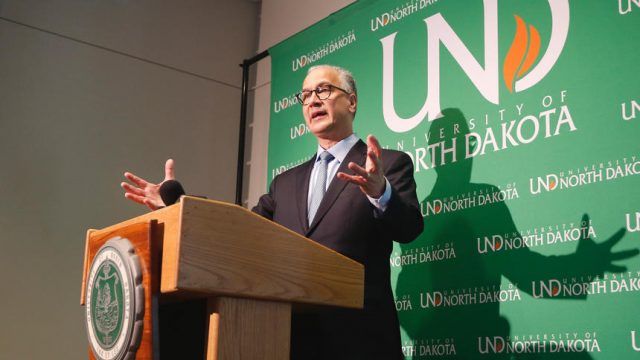UND President Mark Kennedy Gets It: Improved Completion Rates Need to Be the Priority in Higher Education

Mark Kennedy addresses people after being selected as the next President of the University of North Dakota Tuesday at the Gorecki alumni center. Jesse Trelstad/ Grand Forks Herald
UND President Mark Kennedy has a column in the Grand Forks Herald today which illustrates why he is the sort of leader the North Dakota University System has been in desperate need of.
Kennedy writes about the ways in which universities like UND need to adapt to serve students of the future.
The entire piece is worth a read, but this excerpt caught my attention:
Yet perhaps in no place is the need to fit the system to the individual greater than in our effort to increase the percentage of our students that graduate. Studies suggest that college graduates earn a million dollars more over their lifetimes than high school graduates, nearly a 40-to- 1 payback on the average debt from a university like UND. The best way to make college affordable is by making the necessary investments and adaptations to help students graduate and realize the benefits of having a degree.
Traditionally the focus of the North Dakota University System has been on enrollment growth. Remember NDSU President Dean Bresciani’s unilateral push to grow his institution’s enrollment t0 18,000 students – a 24 percent increase – over five years?
That proposal seems to have fallen flat – you certainly don’t hear a lot about it these days – and for good reason.
As I wrote earlier this year, our state’s universities have more to gain from improving completion rates than they do from rapid enrollment growth.
In the past the push to grow enrollment has resulted in a lot of bad policy. Like inflating enrollment by giving away free tuition.
Back in 2013 there had been a sharp spike in the dollar value of institutional waivers (those given at the discretion of the universities), with a peak well north of $30 million in the 2011-2012 academic year. In the 2015-2016 academic year the NDUS issued $29.6 million in discretionary waivers according to the most recent report.
NDSU alone accounted 42 percent of students receiving those waivers.
But who does it help to pack students onto campus almost indiscriminately? The institution, I suppose, and local businesses. Those students will pay a lot of money to the university, and will stimulate the local economies by no small amount, but are the students themselves served well? Are the missions of the universities served well?
It makes more sense for the institutions in the NDUS to serve the students they already have better. Which is what Kennedy is calling for.
Boosting completion rates would not only have the side effect of boosting enrollment – fewer dropouts and transfers mean more students enrolled at any given time – but would also move the focus of the institutions back to serving the students.
How we boost completion rates is something we need to debate. But that improved completion rates need to be the objective is without question.
What proponents of indiscriminate enrollment growth – people like Bresciani – want is a race to the bottom.
Kennedy, meanwhile, is talking about a race to the top.
We should want the latter, not the former.




